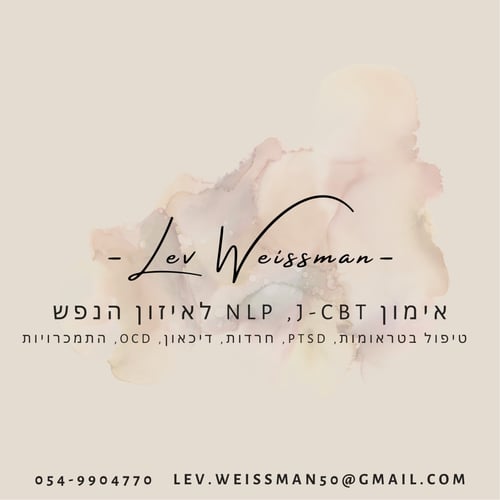Stephen Mitchell and the Tel Aviv Institute of Contemporary Psychoanalysis
Dr. Michael Shoshani and Dr. Batya Shoshani
When I think of describing my relationship with Steve Mitchell, I have doubts and hesitations.
First of all because my acquaintance with him was short and there are people who knew him better, and for many more years. On the other hand, my relationship with Steve was very close and intensive, and had a profound impact on me, and I dare believe it also had that kind of impact on Steve as well.
Secondly, my acquaintance with him was closely related to the project of the establishment of the Tel Aviv Institute for Contemporary Psychoanalysis (TAICP), and I was not sure I could speak of him without getting too deep into issues of the Institute. In contrast, the founding of the Institute was the grounds in which our relationship was born and evolved, so it is only natural that the two are interwoven in my description.
Finally, I feared that what I wanted to share with you resembles the attempt made by a person who has just come out of a very helpful therapeutic session simultaneously trying to explain what exactly helped him. I fear I will not find the way to convey his significance for me and his special manner of supporting, of lighting darkened areas, of facilitating my self-expression and providing me with the courage to implement my vision.
Taking these fears into account I will try to share with you my relationship with Steve. Our relationship formed in the summer of 1999, by which time I began thinking that the dream of founding a new and independent psychoanalytic institute in Israel may materialize. I needed someone to consult with and to receive an external perspective – whether the idea of founding the institute was realistic or was I merely daydreaming. For obvious reasons I knew that my consultant would have to be from outside of the Israeli Psychoanalytic Society, which was founded in 1933 and was the only psychoanalytic institute in Israel. The society was chaired at that time by Prof. Shmuel Erlich, who personally opposed the establishment of such an independent institute. Although it was never the official stance of the Israeli Psychoanalytic Society, the atmosphere rapidly became one of hostility and threats against any training analyst who tried to collaborate with us. As a senior training analyst said in a nut shell; "McCarthyism is back and thriving".
I turned to Steve on the following grounds:
His being an innovative and daring theoretician. His belonging to the William Alanson White Institute, and the New York University post-doctorate program for Psychotherapy and Psychoanalysis, that represent serious, distinguished non-IPA institutes, as well as representing a lineage of theoreticians whose writing affected me throughout the years, including Erich Fromm and Frieda Fromm-Reichman.
His being the founder and editor in chief of the Psychoanalytic Dialogues,
and was well known for his executive and organizational skills. Steve had a vision of a new paradigm in psychoanalysis; the interpersonal-relational school of thought, and he was thus in the midst of materializing his dream.
All these traits and achievements made Steve a unique individual, somebody to look up to, and to emulate.
I had a personal link with Steve through Batya, my wife, who while on sabbatical in New York, by the year of 1995, attended a clinical-theoretical seminar led by Steve and was highly impressed by him and his thought. During a visit in New York in June 1999, Batya met Steve and presented him with a preliminary draft of the conceptual foundation of the new Israeli institute in order to receive an initial response. His supportive, encouraging and above all enthusiastic reaction marked the beginning of our close ties. For me, that also marked the starting point of the founding of the Institute. The first step was the recruit of Dr. Gila Ofer and Michal Hazan. I turned from a founder to an elected chair of the institute. The three of us became the steering committee of the newly founded institute. In the second wave I recruited Naomi Huler, Prof. Beatriz Priel, Alice Buras, Dr. Danielle Knafo, Dr. Shimshon Wigoder, Dr. Carlo Strenger, Dr. Gabi Mann, Hani Biran, Dr. Haim Margalit, Koby Avshalom, Giselle Vered and the interdisciplinary team: Prof. Jose Bruner and Dr. Doreet Hopp. This was the core of the founding group. We began meeting on a regular basis, while simultaneously started our own official training as candidates.
During the first year of our acquaintance (from summer 1999 to summer 2000) my relationship with Steve included daily e-mail correspondence and a long phone conversation once a week. I thus accumulated many “Mitchellian” hours, plus many hours face-to-face with him during his visit in Israel in March 2000, both in personal meetings and in his intensive session with the institute’s founding members.
There was a period when the e-mail correspondence with him was the event of the day for me. Here is a characteristic anecdote from that period: my daughter was traveling in India at that time, and at some point began signing her e-mails “Steve Mitchell”, explaining that by doing so, she could be absolutely sure that Dad would read the e-mail! Upon seeing it, he laughed to the point of tears.
His vitality, humor, warmth and directness were always evident and engaging.
Mitchell's visit to Israel launched three constituting events in the establishment of TAICP. The first was his leading a one-day seminar with the Institute's founding group (at Gabi Mann's house), comparing and contrasting psychoanalysis with psychotherapy. I'm certain that Steve's presence in that seminar and the way he conducted it had a significant role in shaping us from a mere group of professionals into a cohesive team in his guidance. Steve provided us with the essential tenets towards a conceptual foundation of our institute-to-be-born.
The TAICP lawyer took part in this gathering in order to collect the signatures of all the founding members, a procedure which enabled the official establishment of the TAICP as a legal entity and as a non-profit organization. Symbolically, in that moment, the conceptual foundation was translated into a concrete and hard reality by becoming a legal entity.
Second, over a dinner at my house, Steve and I decided he would assume immediately and officially the position of chair of both the advisory committee and the qualifying committee, giving his consent that his name will appear on the head letters of the Tel Aviv Institute.
The third event took place during the conference in March 2000 in which Steve was the main speaker. In his opening remarks, before the lecture itself (as we have agreed the night before), Steve made a dramatic announcement regarding the foundation of a new independent psychoanalytic institute in Israel - an institute to be constituted by a group of fifteen senior clinicians, all of whom well-known supervisors and professors in academic settings, headed by myself. Steve also mentioned that he will be the chair of the advisory committee of this newly-founded institute.
It is difficult to describe the overwhelming impact his announcement had on the four-hundred participants of that forum. People were stunned. The impact continued to echo for the rest of the conference. I have no doubt that this declaration was an extremely dramatic moment in the history of the psychotherapeutic community in Israel which had, from that moment on, changed forever. In that moment the TAICP transformed from fantasy to concrete reality – and the rest is history.
Steve said on different occasions that the Psychoanalytic Institute in Jerusalem, notwithstanding its importance and contribution, has been the only organization in Israel authorized to train psychoanalysts since 1933 and to this day. As such it has acquired the characteristics of a monopoly. Steve's ideas resonated with mine: Obviously, the two most malignant outcomes of a monopolistic organization are (a) complete equivalence of signifier and signified, and (b) a patronizing relationship between the only psychoanalytic institute and potential candidates. In the present state of affairs, the Psychoanalytic Institute chooses its candidates, but the candidates do not choose it, since there is no alternative option.
Since 1933 until today, a complete identification has been created in Israel between “psychoanalysis” and the Israeli Psychoanalytic Society and Institute, including their structure, ideology, target population, work methods, and so on. In other words, the Jerusalem Institute version has turned from a “version” into a “truth,” thus leading to the trap of equating signifier and signified (see Hanna Segal’s illuminating paper from 1957 on Symbol Equation versus Symbol Formation). This state of affairs required the establishment of another Psychoanalytic Institute. This was the expected outcome of the democratization process.
The democratic ideology stemmed inherently from the core of Steve's values and beliefs as well as mine, both influenced by the Frankfurt School.
The more our relationship lasted and deepened I turned to Steve for more assistance. I came to learn that I had the honor and the privilege to be acquainted with a person who was in the process of revolutionizing psychoanalysis in the United States, and probably in the whole world.
He invested a lot of effort and energy in the establishment of our institute and was generous with his time, his wisdom, his extensive knowledge, and his contacts. This was manifested in his willingness to take over as chair of our institute’s advisory board and to utilize his contacts within the international community to enlist supporters such as Thomas Ogden, Jessica Benjamin, Daniel Stern, Adam Phillips, Lewis Aron, Neil Altman, James Grotstein and Robert Stolorow. Later on, more members joined our international advisory and qualifying committees, among them Prof. Paul Ornstein, Prof. Anna Ornstein, Dr. Owen Renik, Dr. Joyce Slochower, Dr. Jonathan Slavin, Dr. Michael Eigen, Dr. Joyce McDougall and Dr. James Fisch.
This historical note should not undermine the role played by numerous training analysts of the Israel Psychoanalytic Society, which offered us their moral support, their vast experience and their guidance, in spite of the persecutory atmosphere and the extreme criticism they were put under; Although the objection to the newly founded institute never became the official stance of the Israeli Psychoanalytic Society.
In addition to his tremendous help with the institute, Steve was also an important source of assistance and creativity with the establishment of the "Israel Psychoanalytic Journal" founded by Prof. Moshe Halevi Spero and myself.
I felt very lucky and moved by his generosity, his executive ability, his pragmatism and his vision, married with diligence and decisiveness, in accordance with my own tendencies and style. And indeed, there was chemistry between us and we saw many issues eye-to-eye.
Like any good "analytic couple", we had our honeymoon and then, after six months of our acquaintance, differences of opinion started to emerge. One of them called for a "couple therapist's" intervention. The subject of the dispute was one of the most debated issues in psychoanalysis: the required number of analyses a candidate should conduct, the number of weekly hours for each analysis, and other closely related issues. We agreed that Prof. Emanuel Berman would be the right person for the job. Emanuel was on the one hand deeply involved with the traditional establishment of the IPA, and on the other hand, he held strong, innovative and revolutionary ideas concerning psychoanalysis in general, and training in particular. Fortunately, Emanuel was at that time in NYC. We had a long phone conversation and he made some suggestions that I found reasonable. Then he had a long breakfast with Steve and presented him a compromise Steve could also accept. Like a good mediator, Emanuel went back and forth between Steve and me. He was able to see and empathically represent both parties' points of view and perspectives. Thus, ultimately, the differences between Steve and I were bridged.
After a short while, the tension subsided, and the previous good rapport has been restored.
The contacts with Steve became increasingly personal and provided me with strength and belief in myself, in the idea, and in the feasibility of its execution.
Through our relationship I learned quite a bit about him as a person. In conversing with him I could detect the power of his theoretical and clinical thinking. I will refrain from delving into an in-depth theoretical discussion. I will only mention three points I experienced personally in our relationship and which are part and parcel of his approach.
Firstly, the strongest impression was of his direct way of speaking, eye-to-eye communication, devoid of airs. No infantilization, neither in friendly nor in therapeutic relationships, but rather a communication between two adults.
Secondly, the freedom to create, initiate and think while disregarding dogmas. Every human situation, every idea, deserves consideration and serious examination, with maximal open-mindedness.
And thirdly, the understanding that everything is dynamic and set in a process, whether people or theories are dealt.
Thus the different approaches in psychoanalysis and the arguments between them were viewed by him as part of a fertile and developing dialogue that advances psychoanalysis, rather than being regarded from the standpoint of the truth versus sacrilege. He himself searched continually for the conjunction between the intrapsychic and the interpersonal.
From my interactions with him I received plenty of strength and legitimacy due to his belief in the individual’s deep-rooted natural right (and perhaps - duty) to dream, to decide, and to carry out his thoughts and aspirations, even if they collide with the establishment. This view is tightly connected to the concept of agency – the individual as sovereign, which Mitchell so steadfastly believed in and elaborated, and whose roots are to be found in the thought of his supervisor Erich Fromm. In this context, he helped me understand that, combined with the enjoyment and the realization in exerting one’s agency, when a person reaches a decision and chooses – he simultaneously loses and renounces. And these inescapable losses must be held, mourned, and one must continue from there.
The Tel Aviv Institute for Contemporary Psychoanalysis has been prematurely orphaned, while I lost a mentor, an ally, and a dear friend, and a soul mate.
We would welcome comments: נשמח לקבל תגובות הקוראים:
Email: shoshani@barak-online.net דוא"ל:
פקס: 03-5229720 Fax:



